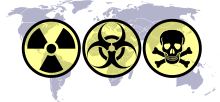| This article includes a list of references, related reading, or external links, but its sources remain unclear because it lacks inline citations. Please help improve this article by introducing more precise citations. (January 2021) (Learn how and when to remove this message) |
Counterproliferation refers to diplomatic, intelligence, and military efforts to combat the proliferation of weapons, including both weapons of mass destruction (WMD), long-range missiles, and certain conventional weapons. Measures to combat proliferation by analysing and preventing related financial transactions are referred to as counter-proliferation financing. Nonproliferation and arms control are related terms. In contrast to nonproliferation, which focuses on diplomatic, legal, and administrative measures to dissuade and impede the acquisition of such weapons, counterproliferation focuses on intelligence, law enforcement, and sometimes military action to prevent their acquisition.
Weapons of mass destruction
Nuclear
Main articles: Nuclear weapon and Radiological weaponBiological
Main article: Biological agentChemical
Main article: Chemical weapon See also: Chlorine, chloramine, phosgene, and hydrogen cyanide See also: Nerve agent, Cholinesterase inhibitor, and Diisopropyl fluorophosphate See also: Chemical Weapons Convention and Materials MASINTWeapons delivery
Missile technology
Long-range missile technology is of greatest threat when the missiles carry weapons of mass destruction, but long-range weapons with precision guidance can be serious threats with explosive or other conventional warheads. This has been supplemented by the International Code of Conduct against Ballistic Missile Proliferation (ICOC), also known as the Hague Code of Conduct.
Technical means of verification, including space-based sensors that can scan large parts of the world, can provide early warning of long-range missile development. Space-based Staring Infrared Sensors can detect the heat of rocket launching motors. Various radars can monitor range and other characteristics, but they need to be in a place where they have line-of-sight to the missile trajectory. The United States, probably Russia, and possibly other nations have aircraft-based and ship-based sensors that can monitor such tests, but there has to be warning of potential tests so these sensors can be deployed.
Conventional weapons
See also: Expanding bullet, Incendiary device, Protocol on Blinding Laser Weapons, Fragmentation (weaponry), Convention on Certain Conventional Weapons, Land mine, Anti-personnel weapon, and Booby trapExternal links
- "About". Center for the Study of Weapons of Mass Destruction > Home. 1 October 2015.
- "Counterproliferation Initiative (PDD 18)". Federation Of American Scientists.
- Foreign Affairs and International Trade Canada Glossary of Terms - Global Partnership Program
- National Counterproliferation Center - Office of the Director of National Intelligence
- United States Air Force Center for Unconventional Weapons Studies
References
- Haberstroh, Frank A. (2022). Counter-Proliferation Financing: Prevention and Detection of Weapons of Mass Destruction Financing Through Internationally valid Compliance Measures (PDF).
- Nonproliferation and Counterproliferation, Justin Anderson, Thomas Devine, Rebecca Gibbons, Oxford Bibliographies, DOI: 10.1093/OBO/9780199743292-0026.
